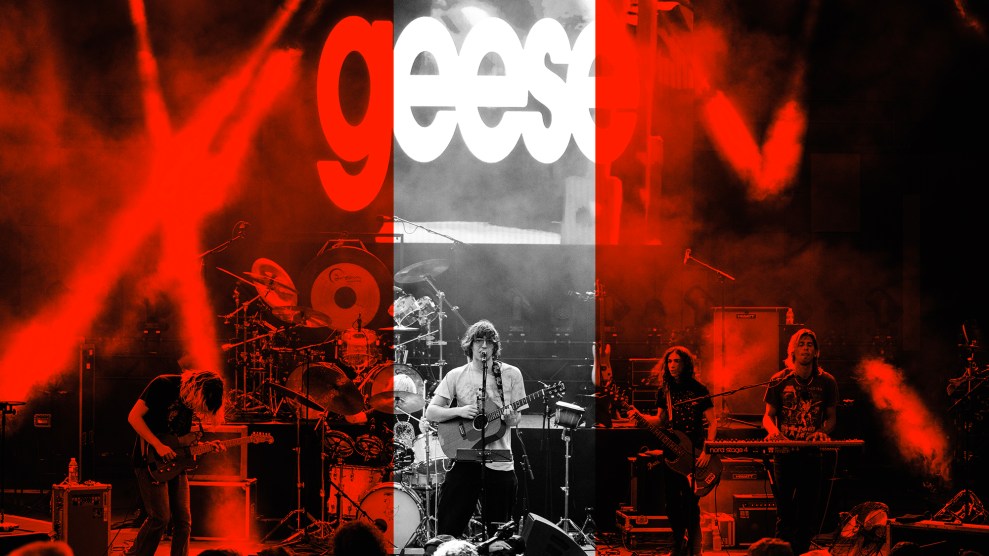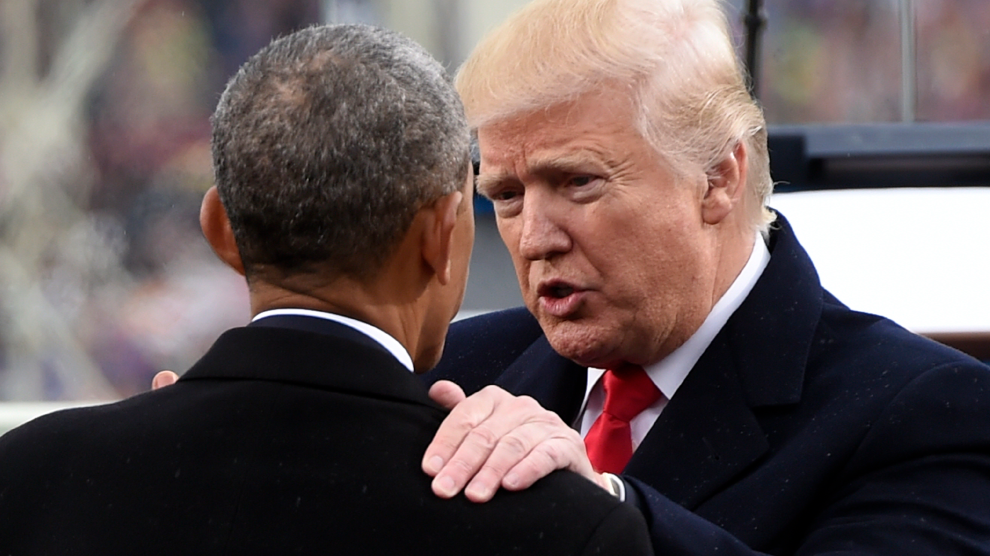Tony Kushner, a gay Jewish socialist who was raised in Louisiana, won a Pulitzer Prize and two Tony Awards for his two-part, seven-hour Broadway production of Angels in America: A Gay Fantasia on National Themes. Other plays, A Bright Room Called Day (1985) and Slavs! (1994), are also concerned with the moral responsibilities of people in politically repressive times. Such concerns may be especially relevant in America today, where, as he observes: “What used to be called liberal is now called radical, what used to be called radical is now called insane, what used to be called reactionary is now called moderate, and what used to be called insane is now called solid conservative thinking.”
Q: Angels in America opened on Broadway just months after the Clinton inauguration. It ends with a very hopeful speech about healing. Do you still feel that hope?
A: You have to have hope. It’s irresponsible to give false hope, which I think a lot of playwrights are guilty of. But I also think it’s irresponsible to simply be a nihilist, which quite a lot of playwrights, especially playwrights younger than me, have become guilty of. I don’t believe you would bother to write a play if you really had no hope. That passage was one of the very first things I ever wrote when I was working on Angels. I read it to the woman who I was originally writing the part of the angel for, who died of breast cancer before the play was finished. In one of my last conversations with her, she told me that she thought about that image a lot and that she hoped I would include it in the play. I think I wouldn’t have included it otherwise, but I’m glad I did now.
Q: Angels in America was a political play–and that’s something Americans and critics frequently resist. How did you overcome that resistance?
A. What I found in the audience response is a huge hunger for political issues and political discussion. So I always wonder: Is it that Americans don’t like politics, or is it that so much theater that is political isn’t well-done? One of the things I learned in Slavs! is that it’s much easier to talk about being gay than it is to talk about being a socialist. People are afraid of socialism, and plays that deal with economics are scarier to them. I’ll learn more about that–my next three plays are all about money.
Also, Angels is very entertaining. It does things formally that are new, and people were excited by the size and the scope. It’s a good play and that makes all the difference.
Thelma and Louise, for instance, is a really terrific movie, and genuinely left in its political sensibilities. It’s well-made, so the fact that it is unquestionably coming from a feminist perspective didn’t make it absolutely marginal the way you would expect such a film to be. It had guns–that probably helped.
Q: People loved Forrest Gump, too.
A. People shouldn’t trust artists and they shouldn’t trust art. Part of the fun of art is that it invites you to interpret it.
There’s a very complicated relationship between form and content and between aesthetics and politics. Good politics will produce good aesthetics, really good politics will produce really good aesthetics, and really good aesthetics, if somebody’s really asking the hard questions and answering them honestly, they’ll probably produce truth, which is to say progressive politics.
Q: Is it hard to write characters that are not caricatures and to overcome the barrier that people have about listening to politics from a character on stage?
A: I think that a character’s politics have to live in the same sort of relationship to the character’s psyche that people’s politics live in relationship to their own psyches. People are never consistent. People will always do surprising things, both good and bad, and the way that people surprise themselves and their audience are the most interesting moments of human behavior. The space between what we’d like to be and what we actually are is where you find out the most interesting things.
Q: Do you see your plays as part of a political movement?
A: I do. I would hate to write anything that wasn’t. I would like my plays to be of use to progressive people. I think preaching to the converted is exactly what art ought to do.
I am happiest when people who are politically engaged in the world say, “Your play meant a lot to me; it helped me think about something, or made me feel like I wasn’t the only person who felt this way.”
It’s the way you feel when you go to a demo, which is the only way to keep sane a lot of the time. You need to remind yourself there are many bodies who are as angry about something as you are.
When I teach writing, I always tell my students you should assume that the audience you’re writing for is smarter than you. You can’t write if you don’t think they’re on your side, because then you start to yell at them or preach down to them.
Q: The character Prelapsarianov–the “world’s oldest living Bolshevik”–gives the same speech in both Angels and Slavs!: “How are we to proceed without theory? Is it enough to reject the past, is it wise to move forward in this blind fashion, without the cold brilliant light of theory to guide the way?… You who live in this sour little age cannot imagine the sheer grandeur of the prospect we gazed upon.”
A: In both Perestroika [part two of Angels] and Slavs!, the whole play proceeds from the question: If you don’t know where you’re going, can you move? And do you even have a choice, or do you just dive in and work it out as you’re going?
That speech came out of a fight I had with my friend Oskar Eustis about Gorbachev. Oskar’s point, which became the basis of Prelapsarianov’s speech, is that if you don’t have a theory to start with–Gorbachev pretended to be about democratic socialism but actually sort of was and sort of wasn’t; he was also sort of about preserving the Communist Party power elite–what do you do? It’s one of those big conundrums.
Q: So what do you do?
A: You can’t stay back. The fundamental question is: Are we made by history or do we make history–and the answer is yes. I was rereading Marx’s Eighteenth Brumaire of Louis Bonaparte recently. The whole tradition in socialist struggle is looking to the past for an antecedent form upon which the present revolutionary response is to be modeled. We may need to stop doing that.
Q: Why does the play Slavs! end with the question: “What is to be done?”
A: I wanted someone to ask the question: What if this really is the end of history? What if there really is literally nothing to be done, and we’re simply stuck with capitalism–although I don’t really think it is a possibility.
I still believe in a dialectical ordering of the universe. There is a dynamic principle at work–it isn’t always mechanically moving things toward the good, but there’s always either some sort of progress or decay. And there’s too much misery in the world. That is not something that can hold.
Q: What do you think is to be done?
A: I’m 38 now. One of the painful rites of passage that everyone on the left goes through is to realize it’s a lifelong struggle. What we’re dealing with from Nixon on as a counter-reaction to the ’60s is a very widespread, long-term historical trend. It’s going to take many years and probably a few decades to reverse. People need to be willing to take an issue that they feel passionately about, address themselves to it as extensively as they are capable of and build common cause between issue groups.
Everybody on the left needs to start talking about how to create, first on local levels and eventually on a national level, a third party or at least a party that could establish some kind of position in Congress. That’s the eternal dream of the left.
Q: You think there’s no hope for revitalizing the Democratic Party?
A: It’s a waste of time at this point. There’s a famous story about Paul Wellstone refusing to shake Jesse Helms’ hand and being chastised by everyone in the Senate because he wouldn’t do it–he was told this is a gentlemen’s club where we’re all colleagues. That’s what’s wrong.
Q: One of the characters in A Bright Room Called Day keeps saying–as Nazism progressively snatches power and the Weimar Republic falls–that each turn for the worse would be the essential spur for people to rise up and oppose fascism. That didn’t happen. Do you see parallels today?
A: You don’t want to be opportunistic about it and say, “Oh, goody, millions of people are going to be thrown out of their homes–now we’ll really get things cooking.” It’s like people saying the AIDS epidemic helped organize the gay and lesbian community.
Q: Speaking of which, there’s a lot of discussion now about the second wave of the AIDS epidemic, and about gay men not practicing safer sex. Where do you weigh in?
A: It’s very difficult to ask people to abstain from pleasure indefinitely, especially sexual erotic pleasure, which is so incredibly important to human beings and the enjoyment of which among homosexuals is so much of a political battlefield. There is absolutely no question that safer sex is not as gratifying and that given all the despair and the unbelievably imponderable weight of loss that the community has had to deal with, self-destructive behaviors are going to be engaged in.
Q: Do you think the gay community should be discussing this publicly?
A: Of course it’s going to be discussed publicly. But you have to be smart. When you make a public utterance you are responsible for being responsible. We’re still an embattled community, and if you’re stupid about it you’ll give aid to the enemy.
Q: Do you have that conundrum as a playwright?
A: You have to say: What am I feeding into? I think you should ask yourself that question and then make the decision based on the answers you come up with. I regret having made the only black person in Angels a nurse; that was an inept thing to do.
I was very scared about writing a play where there’s a couple, one has AIDS and the other walks out. I thought, this is transgressive and scary and am I going to become public enemy number one in the gay community for having written a character like Louis?
On the other hand, you have to be willing to scare the horses. You have to be interesting and you have to be daring and you have to be willing to write things that shock. Shock is part of art. Art that’s polite is not much fun.
Andrea Bernstein writes frequently about politics and culture. She lives in New York.
See Hot Media for more resources.

















